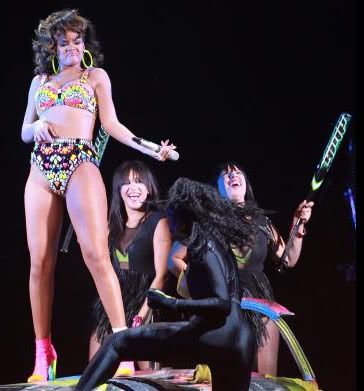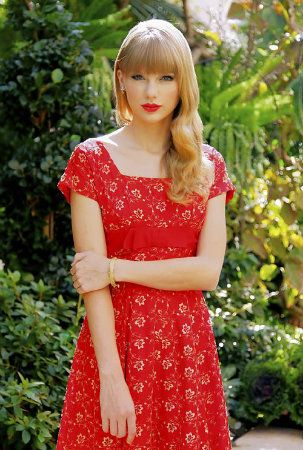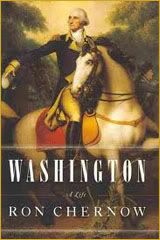 |
Quote from Camille Paglia's December 6, article in the Hollywood Reporter
Mark Richardson, the Oz Conservative, has a post on Camille Paglia which I meant to respond to earlier (I had his link up in my tabs for a few days now).
I had read Paglia's article Mark links to several days ago, and meant to respond to it, but forgot about it (that is how interesting I find Paglia these days, although at one time I was fascinated with her work and read all her major books. I actually think Sexual Personae: Art and Decadence from Nefertiti to Emily Dickinson is quite a feat, and has good things in it).
Still, Paglia has a fascination for non-white, aggressive, overtly sexual culture, which in America means black culture.
In her article she writes the following about the various black and non-white pop female icons:
Rihanna:
...was born and raised on Barbados, and her music...has an elemental eroticintensity,a sensuality inspired by the beauty of the Caribbean sun and sea. The stylish Rihanna’s enigmatic dominatrix pose has thrown some critics off. Anyone who follows tabloids like the Daily Mail online, however, has vicariously enjoyed Rihanna’s indolent vacations, where she lustily imbibes, gambols in the waves and lolls with friends of all available genders [KPA: Not me, I must be one of those critics who was "thrown off" the bandwagon.]. She is the pleasure principle incarnate.Beyonce:
[with a ] Bahamian father and a Louisiana Creole mother...draws on the emotional depths of black gospel as well as the brazen street sass of hip-hop, which produced her formidable persona of Sasha Fierce. Urban rappers’ notorious sexism seems to have made black female performers stronger and more defiant.Jennifer Lopez:
...born to Puerto Rican parents in New York, will go down in history for a revolutionary full-page photo in a 1998 Vanity Fair where she fetchingly turned her ample, lingerie-clad buttocks to the camera. It was the first time that the traditional eroticization by Latin and black culture of that bulbous part of the anatomy had ever received mainstream recognition in the U.S. The next step was taken by Destiny’s Child with their 2001 hit “Bootylicious” -- a term (invented by rapper Snoop Dogg) that instantly became associated with the trio’s breakout star, Beyonce Knowles.I've written about all three here, under Mulatta Madonnas, and not in the glowing, admiring manner that Paglia writes.
Here are excerpts from various of my posts on these pop stars:
Mulatta Madonnas:
Current pop culture is awash with mulattas: Beyonce, Rihanna, Alicia Keys, Leona Lewis to name a few. These are women celebrities, often singers, who have at least a parent, a grandparent, or some heritage (Beyonce calls herself Creole) that is white. They, of course, identify themselves as black, but their behavior and creativity is subtly unique. Unlike black pop stars who attract a core black audience, these mulattas seem to be super, even mega, stars for all.I commented earlier in this blog article on the eroticized, violent nature of these women's image:
They resemble one another, to the extent that they may be cultivating a movement. They present a body image that is larger and heavier than other white pop stars. They often have long, artificial hair, usually unnatural reds, blondes or browns. The wear overtly sexual clothes, both on and off stage, like all pop stars these days. But in their case, it is taken up a few notches.
...on stage, they are aggressive and sexual.
...this mulatta group is more interested in presence than substance. Their songs are simplistic and mediocre, although initially catchy, and their choreography inferior. Their aggression is the vehicle that carries them through their performances.
In rare moments, their belligerence also comes through in public. Alicia Keys is famous for saying that she wears AK-47 pendent around her neck "to symbolize strength, power and killing 'em [white people] dead." Beyonce is married to rap singer Jay-Z who was once a drug dealer. And Rihanna went through a public “domestic violence” case where further investigation shows that she wasn’t exactly a saint in the relationshipBeyonce and her Soldiers:
[Beyonce] entered the [2010 Grammy Awards] stage in a leather mini-skirt covered in studs. And following her were futuristic-type dancers, which commentators called her body guards, but to me they looked like an army of soldiers. Her song, titled "If I were a boy," was an interesting parody of a woman betrayed by a man, who tells him how she would be a better man than he.On Alicia Keys, from Mulatta Madonnas:
I read more into the song...I think there is a subtle black supremacist sub-message occurring in many black artists' works these days, and I think Beyonce is feeding off that energy. Some are much more direct, as I quoted Alicia Keys deriving her energy from the Black Panthers's ideology. Beyonce is the least aggressive of them all, which perhaps explains her huge popularity. But, I find that her behavior at performance constantly at odds with her pleasant personality, and her pent-up energy is released in her sexually charged performances and aggressive style.
Alicia Keys is famous for saying that she wears AK-47 pendent around her neck "to symbolize strength, power and killing 'em [white people] dead."Rihanna sings to the anti-christ:
Rihanna, the pop star, was sporting some kind of leather jacket with crosses printed on it at a recent event. That's nothing unusual in pop fashion. Madonna made the cross into some kind of pop fashion statement, and many follow her example.Jennifer Lopez's Wriggles...
But Rihanna's cross is a new evolution. I can only see two imprinted on her jacket. One is right-side-up, the other is upside-down.
...I doubt the perverse Rihanna [is] thinking of [her] salvation when [she] sport[s] this symbol. [Her] intentions are much more nefarious.
You can watch Jennifer Lopez performing on New Year’s Eve. Her aggressive moves, her hostile expression and her scant clothing, represents much of what the original Mulatta Madonnas are about.And more on Lopez here, where she was judging on the variety show American Idol:
Jennifer Lopez wriggles on the dance floor with her non-singing voice squeaking out mediocre melodies, making sure the attention is on her moves rather than her voice. Recently on the variety show American Idol...[w]e also had to watch her perform a stripper dance...Even Ryan Seacrest, the diplomatic host of the show couldn't help saying: "Is that the kind of think you do at home?" at the end of her performance.These violent, aggressive blacks is what Paglia is praising. Yet the more sanitized, albeit not completely innocent, looks of Taylor Swift gets this from Paglia (from the above linked article):
Middle-class white girls will never escape the cookie-cutter tyranny of their airless ghettos until the entertainment industry looks into its soul and starts giving them powerful models of mature womanliness.Paglia, like her black role models, seems to exalt in the violent and aggressive. Taylor Swift, in her pretty red frocks and sweet (but kind of pathetic) "break-up" songs, is labeled as promoting a cookie-cutter tyranny in her airless ghetto. Young white women looking (and liking to look) feminine are some kind of white female tyrants, according to Paglia, especially if they show any kind of confidence in their femininity. Black women behaving aggressively and confidently (I've purposefully used "aggressively" rather than "assertively to describe black women's sexual confidence) are praised, and are never tyrants.
Taylor Swift was recently accosted by two blacks, which I've written about.
Once by Michelle Obama who presented an award to her at the Nickelodeon's Kids Choice Awards, where I write:
Below is Michelle Obama with Taylor Swift, who says as she receives the award "I'm freaking out!" according to the Mail article. I'm sure she's overwhelmed. The photograph below subliminally captures Taylor's "freaking out" moment, as she instinctively gathers in her prize, and seems to be running away from a stalking Michelle. I would be terrified too, with this imposing woman standing so close behind.And another time by Kanye West, the black rapper who, I write here:
...interrupted (shoved aside, more like) Taylor Swift when she was accepting a "Best Female Video" award at the Video Music Awards in 2009, by telling her and everybody else that Beyonce should have won. Scroll down for the clip here.
 |













